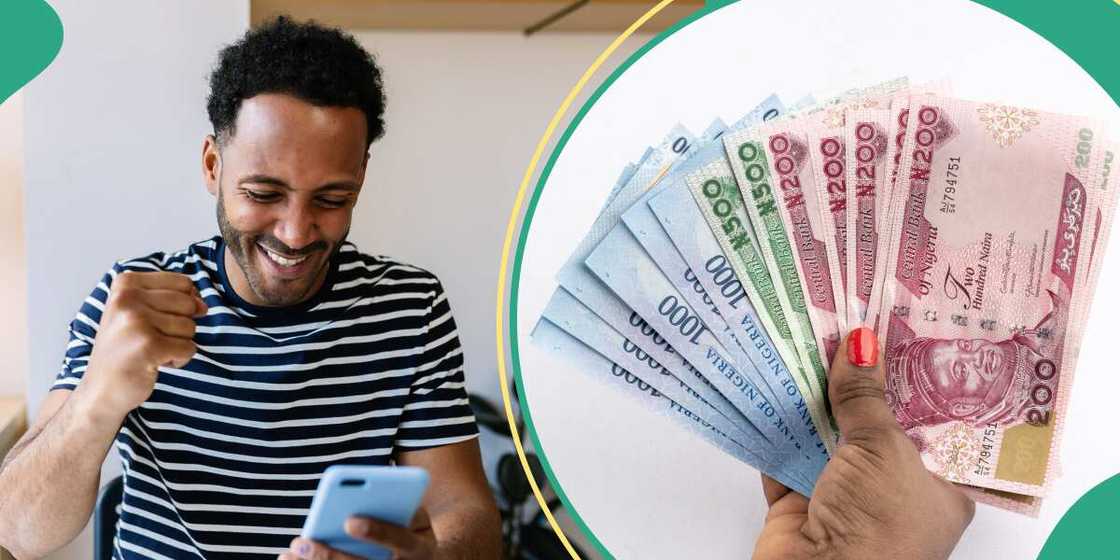Naira Recovers After Days of Depreciation as External Reserves Increase Despite Shocks
- The Nigerian naira returned to gains against the US dollar after days of depreciation in the official and black market windows
- The naira’s rebound is directly linked to the surging external reserves, which climbed $43.4 billion on new accretions
- Experts say the rebound is improving market sentiment, as the stock market is currently experiencing sell-offs
Pascal Oparada is a journalist with Legit.ng, covering technology, energy, stocks, investment, and the economy for over a decade.
Nigeria’s currency regained ground on Thursday, November 13, 2025, rising to N1441 per dollar across both the official and parallel markets.
The turnaround came after several days of depreciation, offering a rare breather for businesses and individuals grappling with currency volatility.

Source: Getty Images
The improvement followed steady inflows into the country’s external reserves.
CBN slows FX interventions
This consistent buildup has been a major confidence booster for investors and has helped squeeze out speculative activities that fuel market instability.
Although the Central Bank of Nigeria (CBN) has slowed its direct intervention in the market, the regulator continues to maintain a tight grip on the supply of foreign exchange.
The gradual approach is aimed at allowing the naira to find a more sustainable value rather than relying solely on heavy intervention.
Market confidence improves as blocked funds decline
Fresh data from the CBN shows a steady reduction in Nigeria’s blocked funds, the segment of reserves not immediately accessible due to previous capital controls and FX shortages.
The decline signals a more open and flexible FX regime, allowing airlines and other foreign companies to repatriate funds more easily.
The naira appreciated by 0.11 percent in the official market to 1441.44 per dollar.
The parallel market saw an even stronger jump of 0.34 percent to 1455 per dollar, indicating better liquidity and rising demand for the local currency.

Source: Getty Images
The central bank noted that the naira hit an intraday high of 1439.35 per dollar, stronger than the previous day’s N1444.85.
Some transactions even closed at N1437 per dollar, reflecting the improved availability of foreign exchange in the system.
External reserves hit $43.4bn after new inflows
Nigeria’s external reserves rose to 43.427 billion dollars following recent inflows linked to the country’s successful Eurobond issuance.
The positive movement has strengthened the country’s FX buffers and widened the space for meeting dollar demands.
With reserves rising, blocked funds have continued to shrink. From the start of the month, they have dropped from 615.478 million dollars to 587.209 million.
This represents a long-awaited relief for sectors previously affected by prolonged FX scarcity.
For most of 2023, blocked funds were stuck above the one-billion-dollar mark as foreign businesses struggled to move profits out of the country.
The situation began to ease in 2025 as fresh inflows and policy reforms took hold. By early this year, blocked funds had fallen from 774.65 million dollars to their current level.
A more stable FX outlook
The combination of rising reserves, easing demand for dollars and a clearer FX policy direction is helping the naira regain stability after months of swings.

Read also
Eurobond: Massive boost for naira as experts predict Nigeria’s reserves to hit $45bn December
While risks remain, especially from global market shocks, the current trend points toward a more balanced and less volatile currency environment for Nigeria.
Naira reverses gain, crashes to 10-day low
Legit.ng earlier reported that the naira further depreciated against the United States dollar on Wednesday, November 12, in the Nigerian official exchange market.
According to the Central Bank of Nigeria's latest update, the naira on Wednesday slipped to a 10-day low of N1,443.08 per dollar.
The currency last traded below this level on October 29, 2024, when it closed at N1,444.42 per dollar.
Proofreading by James Ojo, copy editor at Legit.ng.
Source: Legit.ng


